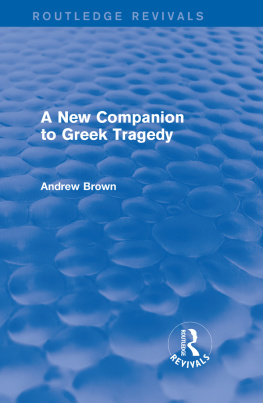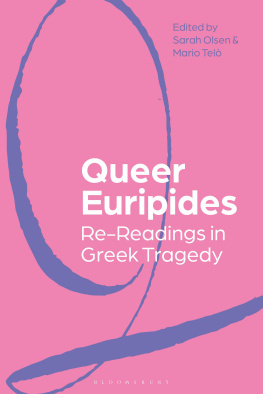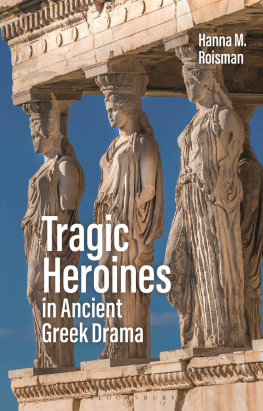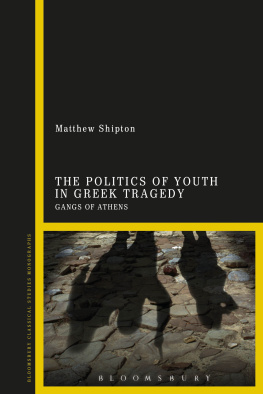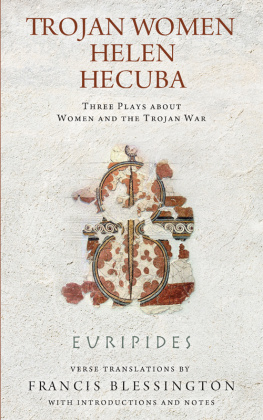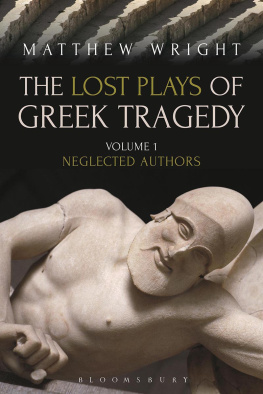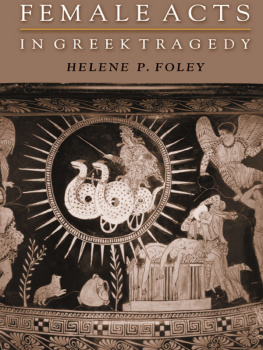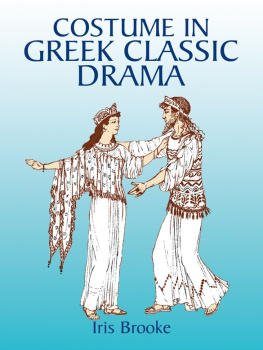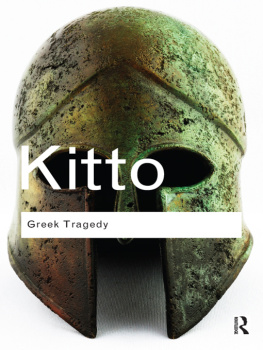ACTING GREEK TRAGEDY
In this book I shall be giving an account of an approach I have been using in the studio over a number of years, and which I have developed through a longer period studying the theatricality of ancient Greek tragedy The approach I have found to be best is one that draws on an essentially dramaturgical analysis in the actor, and which then applies that understanding in and through performance. So a more accurate title for the book might actually be preparing to act Greek tragedy, since it concentrates on methods of preparation for a testing realization in a workshop performance in the studio.
from the authors Preface
Graham Ley is Professor Emeritus of Drama at the University of Exeter
First published in 2014 by
University of Exeter Press
Reed Hall, Streatham Drive
Exeter EX4 4QR
UK
www.exeterpress.co.uk
2014 Graham Ley
The right of Graham Ley to be identified as author of this work has been asserted by him in accordance with the Copyright, Designs and Patents Act 1988.
British Library Cataloguing in Publication Data
A catalogue record for this book is available from the British Library.
Paperback ISBN 978 0 85989 893 5
Hardback ISBN 978 0 85989 892 8
Cover design by Holly Rose and Stephanie Sarlos
Typeset in Sabon by
Kestrel Data, Exeter
Printed in Great Britain by
Short Run Press Ltd, Exeter
PREFACE WELCOME
In this book I shall be giving an account of an approach I have been using in the studio over a number of years, and which I have developed through a longer period studying the theatricality of ancient Greek tragedy. I would not in the first instance call it a form of actor-training, since it is not primarily concerned with a regime to develop voice and movement skills, nor does it have a hard focus on inhabiting character. The approach I have found to be best is one that draws on an essentially dramaturgical analysis in the actor, and which then applies that understanding in and through performance. So a more accurate title for the book might actually be preparing to act Greek tragedy, since it concentrates on methods of preparation for a testing realization in a workshop performance in the studio.
There are sound reasons for this, which go beyond the obvious need to prepare well before you enact. These are that modern productions of ancient Greek tragedy must and do show a bewildering variety of different forms, according to the inclinations and inspirations of the practitioners who are taking the initiative to put them on. It is necessary for actors to be open-minded and flexible in their attitude to productions, and to the direction and mise-en-scene that will animate the performances; but it is unreasonable and unwise to expect actors to go into a production process unprepared.
Actors need to be able to develop confidence in their ability to handle any material, and Greek tragedy is a potentially daunting prospect. I would suggest that trust in a director to supply all is inappropriate, since the performance of Greek tragedy may be just as much an unknown to directors as to actors. There is nothing wrong with a path of discovery; but discovery with trained actors is a far more dynamic process than wandering around totally in the dark, searching for the beginning of that path.
So why would thoughtful actors (or directors) be unprepared for Greek tragedy, especially if they have already been through a sound course of training? The answer to that is that ancient Greek tragedy is at risk, despite its distinct appeal over the centuries, of being culturally locked in. This is as true of the beliefs that activate its characters as it is of the form in which it operates, which is unlike anything that we find in theatre today. This combination means that it is not truly accessible to the kind of training in interpretative acting that may prove highly effective with later European drama. Clearly such training will give an actor a fair start, but it is not sufficiently specific to go beyond a certain point, and any performance will contain far too many leaps of faith for comfort.
Some may ask at this point why a contemporary actor would want to bother with Greek tragedy at all, let alone take on the questionable burden of a specific approach to acting it. The answer to that is that it supplies some of the best available classic roles for women as well as outstanding roles for men. The fact that those roles were not originally written for performance by women is not an obstacle: the female characters are no less seriously conceived than the male, and they represent women at all ages of life. It is a remarkable resource, waiting to be exploited and opened out to audiences.
While I would hope that you might work happily as an actor from this book without already knowing much in advance about Greek tragedy or the ancient theatre, I would recommend that you do take a good look at the broader picture. I am going to assume that you will find out elsewhere about the three tragic playwrights, Aeschylus, Sophocles and Euripides, and the relationship between performers and audience expressed in the ancient playing-space, amongst other important information. There are many ways of doing that, but you can find informative guidance in my own A Short Introduction to the Ancient Greek Theater (second edition) which is published by the University of Chicago Press, and is readily available.
I shall not delay the Introduction any further. What I shall be doing there is to outline a concept that will be central to my approach, and illustrate it before adopting and deploying it throughout the rest of the book. That concept is not itself culturally specific, but it serves as a means to unlock the beliefs and the forms of expression used in dramatic texts such as those from antiquity. Once the idea of it is grasped, it can be applied consistently across all four Workshops that form the main substance of this book.
So these opening words serve as a welcome and an invitation to work thatif it is undertaken with commitment and given sufficient timewill undoubtedly change your ability to perform Greek tragic scripts.
FIRST WORKSHOP Monologues
I always start the full sequence of Workshops with what can be called for convenience monologue, although there is more to that term, which I shall soon explain. The fact is that monologues are familiar technical territory to many actors, and it is possible for workshop participants to work in pairs on the same piece, which I think is constructive at an opening stage. We then also get a taste of a good range of Greek material, seen through the experience of individual dramatic characters. All this makes the work accessible and relatively easily assimilated in the first steps, since there is a great deal to take on board. Just about everything to do with acting Greek tragedy requires an adjustment to assumptions or set practices, and there is little point in making an assault out of the process of learning.
The second, convenient quality of working from monologues is that it is possible to introduce a large number of the important considerations attached to the idea of transactions without heading straight into the core of the idea itself. It is not so much that the core idea is difficult to grasp; but when you are adjusting in almost every way as a performer, integrating and implementing what can seem initially like a central concept can be daunting and counterproductive. The temptation will then be to go for the concept at all costs, when in fact the supposed concept is a formulation of what should take place through analysis and realization.


